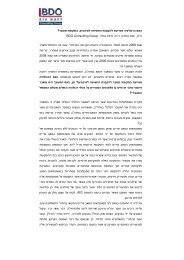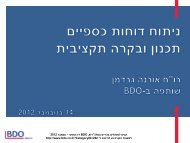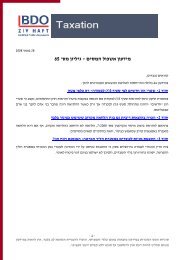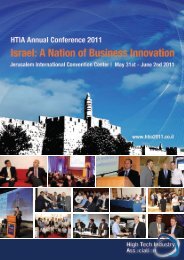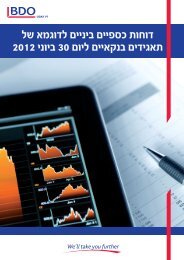preface
preface
preface
You also want an ePaper? Increase the reach of your titles
YUMPU automatically turns print PDFs into web optimized ePapers that Google loves.
5.4. TRADE AGREEMENTS<br />
56<br />
BUSINESS ENVIRONMENT<br />
Israel has entered into several trade agreements in order to strengthen its<br />
position in international markets. The most significant agreements are the Free<br />
Trade Area Agreement with the European Union, Free Trade Area Agreement<br />
(FTA) with the United States, and Free Trade Area Agreement with the<br />
European Free Trade Association States (EFTA). The agreements with the<br />
European Union, the United States and EFTA countries place Israel in the<br />
unique position of being a Free Trade Area partner with the principal economic<br />
regions worldwide. Thus, Israel is able to act as an intermediary for countries<br />
that do not have mutual agreements, provided that products comply with the<br />
provisions of each agreement. In addition, Israel has signed FTA Agreements<br />
with Canada and Turkey, a General Agreement on Tariffs and Trade (GATT)<br />
with the World Trade Organization, and has been granted preferences under the<br />
GSP (General System of Preferences) by Australia, Austria, Canada, Finland,<br />
Japan, New Zealand, Norway, Sweden, Switzerland, and the United States. As<br />
part of the peace process, Israel signed an Agreement for Economic<br />
Development with the Palestinian Authority.<br />
5.4.1. Israel-European Union Free Trade Agreement<br />
In 1995 Israel entered into an Agreement for the establishment of a free<br />
trade zone with the European Union for industrial products and some<br />
agricultural products.<br />
Under this Agreement, most Israeli-made products are exempt from<br />
import duties. On its part, Israel gradually reduced import duties on<br />
European-made products.<br />
In general, to be eligible for exemption from import duties, products are<br />
required to comply with certain “rules of origin”. These rules require a<br />
minimum local-added-value depending on the origin of materials,<br />
manufacturing process, etc.<br />
Tariff and non-tariff barriers still exist concerning agricultural products<br />
and processed foods in respect of international trade with the European<br />
Union.<br />
BDO Israel




